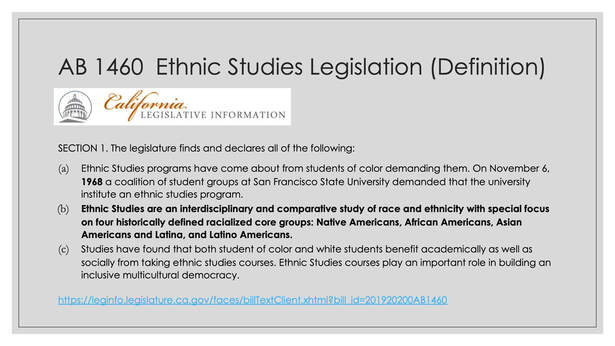California Assembly Bill AB 506 Summary
Background and Problem Statement
The approval process for CCC courses to meet the CSU Area F Ethnic Studies Requirement began in spring of 2021. During this time California Community Colleges throughout the state encountered numerous challenges with their Ethnic Studies course submissions resulting in the denial of an unprecedented number of authentic Ethnic Studies courses.
CCCESFC leadership worked successfully with the CCC Chancellor's Office on the Ethnic Studies Taskforce in the creation and development of core competencies for the new CCC Ethnic Studies graduation and transfer requirement. However, since 2021 there has been a plethora of ongoing problems with the CSU Ethnic Studies Area F review and approval process that primarily include but are not limited to the following:
* Differences between the CSU and CCC curriculum structure. The CSU’s utilize syllabi while the CCC’s use Course Outlines of Record. Because of this difference in curriculum structure, selected CSU Ethnic Studies Area F reviewers, did not have appropriate training and were unfamiliar with our system and Title 5 Education Code policies and constraints which have led to the denial of a majority of authentic Ethnic Studies courses.
* The current CSU Area F review and approval process has remained inconsistent for nearly three years with changes occurring every year without timely and accurate communication prior to the December curriculum submission deadline.
* Ineffective communication and transparency about the overall review and approval process itself has led to mass confusion throughout the state.
* Ambiguous, imprecise and obscure reviewer comments associated with course denials and the lack of clear and sufficient explanations for these mass denials.
* Different CSU reviewers assessing the same course curriculum resubmissions produce conflicting messaging resulting in repeated course denials over multiple years. This reveals the reviewer subjectivity and inconsistency in the review and approval process.
* Selected reviewers from the CSU Chancellor’s Office were not vetted or approved by discipline experts from the CSU Ethnic Studies Faculty Council.
The Need for AB506
In an effort to address the challenges outlined above, AB 506 was developed to ensure the appropriate alignment of the current Ethnic Studies Area F review process within existing fund allocation processes by discipline faculty. Due to incompetent, inequitable, non-transparent reviews as conducted to date, many California Community Colleges (CCC) have submitted course proposals, received denials, revised and resubmitted courses for Area F consideration up to 6 times without achieving approval even when local CSU campuses have approved some of these denied courses. CCC faculty who have requested information to improve course proposals have received no and/or insufficient responses and/or specific guidance.
During the 2022-23 review submission cycle, the CSU Chancellor’s Office failed to provide their newly developed Review Rubric to California Community Colleges. Consequently, community colleges prepared courses that were denied based on a rubric that they had not received from the CSU Chancellor’s Office.
The inconsistencies and confusion resulting from the current incompetent process has led to an unprecedented addition of 3 Ethnic Studies Area F “appeal” submission cycles that followed 3 annual CSUGE-B submission cycles. In December of 2022, three hundred (300) course proposals were submitted during the last CSUGE-B Ethnic Studies Area F submission cycle with only 11 course approvals. AB 506, intends to eliminate the cost associated with excessive resubmissions.
To align with the goal of the ASCCC and CSU colleagues, the intent of AB 506 is to establish a collaborative effort among CSU and CCC colleagues to effectively align the current Ethnic Studies Area F review process needed to produce better outcomes. This requires:
* Competent experts from the each of the four autonomous Ethnic Studies disciplines as vetted and approved by each of the disciplines;
* Training of course reviewers (with discipline expert approval) regarding the standards that govern each discipline and policies and procedures which govern California Community College curriculum;
* Consistent, transparent and clear decision-making practices (as vetted by each of the disciplines) in the review of course proposals;
* Dissemination of review criteria which accurately represents each of the four autonomous Ethnic Studies disciplines, well in advance of the Ethnic Studies Area F submission cycles.
* Non-Ethnic Studies courses to re-submit for CSU Area F approval under the newly revised process.
What AB 506 will not do
*AB 506 will NOT cost the State of California any additional revenue as alleged by the California Community Colleges Chancellor’s Office (CCCCO), the California State University Chancellor’s Office and the University of California Office of the President (UCOP) Fiscal Assessment report. In fact, the CCCCO is not involved in the Area F review process at all; therefore, it is unclear about their role in the fiscal assessment.
* In addition, at issue is that Community College Ethnic Studies faculty and CSU Ethnic Studies faculty have purview over curriculum via their Academic Senates. CSU Ethnic Studies faculty have not been included in the review of Area F curriculum submissions that meet discipline specific standards as is a more common occurrence when changes are made among other more ‘traditional’ disciplines.
* AB 506 will NOT prevent students from graduating and transferring in a timely manner.
* Students who have currently taken a CSU Area F approved course are grandfathered in and will not have to repeat the course.
The approval process for CCC courses to meet the CSU Area F Ethnic Studies Requirement began in spring of 2021. During this time California Community Colleges throughout the state encountered numerous challenges with their Ethnic Studies course submissions resulting in the denial of an unprecedented number of authentic Ethnic Studies courses.
CCCESFC leadership worked successfully with the CCC Chancellor's Office on the Ethnic Studies Taskforce in the creation and development of core competencies for the new CCC Ethnic Studies graduation and transfer requirement. However, since 2021 there has been a plethora of ongoing problems with the CSU Ethnic Studies Area F review and approval process that primarily include but are not limited to the following:
* Differences between the CSU and CCC curriculum structure. The CSU’s utilize syllabi while the CCC’s use Course Outlines of Record. Because of this difference in curriculum structure, selected CSU Ethnic Studies Area F reviewers, did not have appropriate training and were unfamiliar with our system and Title 5 Education Code policies and constraints which have led to the denial of a majority of authentic Ethnic Studies courses.
* The current CSU Area F review and approval process has remained inconsistent for nearly three years with changes occurring every year without timely and accurate communication prior to the December curriculum submission deadline.
* Ineffective communication and transparency about the overall review and approval process itself has led to mass confusion throughout the state.
* Ambiguous, imprecise and obscure reviewer comments associated with course denials and the lack of clear and sufficient explanations for these mass denials.
* Different CSU reviewers assessing the same course curriculum resubmissions produce conflicting messaging resulting in repeated course denials over multiple years. This reveals the reviewer subjectivity and inconsistency in the review and approval process.
* Selected reviewers from the CSU Chancellor’s Office were not vetted or approved by discipline experts from the CSU Ethnic Studies Faculty Council.
The Need for AB506
In an effort to address the challenges outlined above, AB 506 was developed to ensure the appropriate alignment of the current Ethnic Studies Area F review process within existing fund allocation processes by discipline faculty. Due to incompetent, inequitable, non-transparent reviews as conducted to date, many California Community Colleges (CCC) have submitted course proposals, received denials, revised and resubmitted courses for Area F consideration up to 6 times without achieving approval even when local CSU campuses have approved some of these denied courses. CCC faculty who have requested information to improve course proposals have received no and/or insufficient responses and/or specific guidance.
During the 2022-23 review submission cycle, the CSU Chancellor’s Office failed to provide their newly developed Review Rubric to California Community Colleges. Consequently, community colleges prepared courses that were denied based on a rubric that they had not received from the CSU Chancellor’s Office.
The inconsistencies and confusion resulting from the current incompetent process has led to an unprecedented addition of 3 Ethnic Studies Area F “appeal” submission cycles that followed 3 annual CSUGE-B submission cycles. In December of 2022, three hundred (300) course proposals were submitted during the last CSUGE-B Ethnic Studies Area F submission cycle with only 11 course approvals. AB 506, intends to eliminate the cost associated with excessive resubmissions.
To align with the goal of the ASCCC and CSU colleagues, the intent of AB 506 is to establish a collaborative effort among CSU and CCC colleagues to effectively align the current Ethnic Studies Area F review process needed to produce better outcomes. This requires:
* Competent experts from the each of the four autonomous Ethnic Studies disciplines as vetted and approved by each of the disciplines;
* Training of course reviewers (with discipline expert approval) regarding the standards that govern each discipline and policies and procedures which govern California Community College curriculum;
* Consistent, transparent and clear decision-making practices (as vetted by each of the disciplines) in the review of course proposals;
* Dissemination of review criteria which accurately represents each of the four autonomous Ethnic Studies disciplines, well in advance of the Ethnic Studies Area F submission cycles.
* Non-Ethnic Studies courses to re-submit for CSU Area F approval under the newly revised process.
What AB 506 will not do
*AB 506 will NOT cost the State of California any additional revenue as alleged by the California Community Colleges Chancellor’s Office (CCCCO), the California State University Chancellor’s Office and the University of California Office of the President (UCOP) Fiscal Assessment report. In fact, the CCCCO is not involved in the Area F review process at all; therefore, it is unclear about their role in the fiscal assessment.
* In addition, at issue is that Community College Ethnic Studies faculty and CSU Ethnic Studies faculty have purview over curriculum via their Academic Senates. CSU Ethnic Studies faculty have not been included in the review of Area F curriculum submissions that meet discipline specific standards as is a more common occurrence when changes are made among other more ‘traditional’ disciplines.
* AB 506 will NOT prevent students from graduating and transferring in a timely manner.
* Students who have currently taken a CSU Area F approved course are grandfathered in and will not have to repeat the course.
Status to Date
To date AB506 is suspended in committee. However, the CCCESFC remains committed to working stakeholders (i.e., community, professional organizations, academic and legislative allies, etc.) to achieve a more effective CSU Area F review and approval process for Ethnic Studies courses to ensure that students receive quality authentic Ethnic Studies courses and instruction from qualified Ethnic Studies discipline experts.
To date AB506 is suspended in committee. However, the CCCESFC remains committed to working stakeholders (i.e., community, professional organizations, academic and legislative allies, etc.) to achieve a more effective CSU Area F review and approval process for Ethnic Studies courses to ensure that students receive quality authentic Ethnic Studies courses and instruction from qualified Ethnic Studies discipline experts.
California Assembly Bill AB 1460
|
Assemblymember Dr. Shirley Weber discusses the value of Ethnic Studies to California State Legislators.
“Gov. Newsom, by signing AB 1460, has demonstrated his understanding of the power of a true ethnic studies graduation requirement to change people’s lives and to change the racial trajectory this state and country are on,”
- Charles Toombs CSU Faculty Association, President. |


